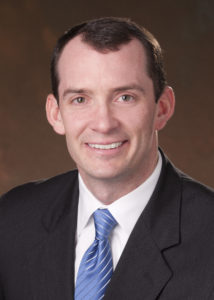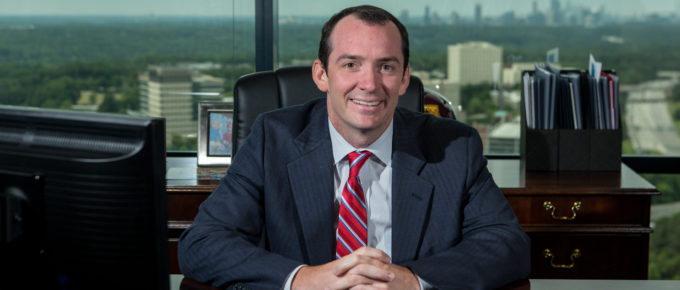
“In the past, people with busy schedules, couldn’t travel for interviews, maybe couldn’t miss a meeting, doing it virtually we’ve had great attendance for these interviews. The search committees are all there, coaches are available right now. People are more available; they’ve had more time to prepare for the interview.”
Daniel Parker, Vice President and Managing Director at Parker Executive Search, has had an interesting few months. His executive search business, that has relied heavily on face-to-face meetings in the past, has evolved to take place in the virtual world.
 “Back in the beginning of the pandemic, this was seen as a health and economic crisis, and those important things were a priority over hiring leaders,” Parker explains. “Now what we are seeing is some type of new normal, which is constantly changing and evolving. We see a lot of our clients reaching out and saying, ‘hey, we would like to continue that search that we put on pause’ or we have had some clients say, ‘let’s start a new search,’ they want to press forward. At the end of the day they need leadership and that’s what our firm does, we recruit leaders for universities and organizations.”
“Back in the beginning of the pandemic, this was seen as a health and economic crisis, and those important things were a priority over hiring leaders,” Parker explains. “Now what we are seeing is some type of new normal, which is constantly changing and evolving. We see a lot of our clients reaching out and saying, ‘hey, we would like to continue that search that we put on pause’ or we have had some clients say, ‘let’s start a new search,’ they want to press forward. At the end of the day they need leadership and that’s what our firm does, we recruit leaders for universities and organizations.”
Parker Executive Search is a global retained executive search firm with a client base that includes top intercollegiate athletics programs and sports businesses. While some of his clients did hit pause during the initial stages of the pandemic, many are now starting to resume their searches.
“There is always going to be a need for strong leadership on campuses and in organizations, and how we’ve had to adapt and change is certainly fluid. We started using Zoom over a year ago during the initial interview stage. We’ve always been very progressive on our search process, helping to hold costs down for our clients using Zoom or Skype early on. It’s effective because you can get people together across the country without the costs associated with hotels or airplanes that can get very expensive during a search.”
Parker explains to CollegeAD, that before the stay-at-home orders started, institutions could fly eight to ten candidates to their city, between the airfare and hotels the costs could reach the tens of thousands. That’s not including the travel expenses of gathering their search committee at a hotel for two days. His firm would typically start out with a large pool of phone interviews, then as the pool gets smaller, they start the on-campus portion of the hiring process.
“The biggest change is the final round of interviews or the campus visit. You want to spend time with these people, you want to have lunches or dinners so you can have face to face interaction, but that’s just not a reality right now.”
Parker says campuses are adapting, he’s seen entire campus forums being held in the virtual space.
“In the last few days, we have a school that’s going through the entire hiring process on Zoom. The open forum had about 100 people attending virtually. The candidate went online and did their presentation virtually, that’s the biggest difference.” 
He also says it’s easier to get more people involved in the process, schedules are clearer and more flexible; it’s easier to find the time for important discussions, and everyone has more time to do their homework before the zoom meetings start. Information has become even more of a top priority.
“Having a real relationship that will give you information on people has never been more important than now, because if you want to get to know the candidate, you need to know as much as you can about them.” He adds, “I think that’s where we continue to add great value to our clients, understanding that it is different but still being able to give them real time information on individuals.”
Parker says complete reviews into the candidate’s social media have become the new norm.
“We are doing deep dives on their social media, scrubbing candidate profiles from when Twitter started to know everything about what they’ve said and then giving that to our clients so they can make an informed decision.”
He explains that clients are reaching out to more references, those both on the reference list, and off the list as well.
“Now taking the time to call more people is as important as ever, because you always want to call the ‘on’ list references, but now calling the ‘off’ list references is just as critical now. Having a search team with you that has the relationships is important. It’s one thing to call references, but you want to have the right information and get to the people that will be honest with you.”
Clients are much more likely to ask references about personality and style because it’s something they can no longer gauge with a handshake.
“How did this person move the needle on development, on student-athlete welfare? The real-world examples become more important, even if there are areas of concern, and it’s not what you want to hear, it’s important that we get that information to our clients.”
As for the people on the other end of the interview process, Parker says life has changed for them as well. Nailing the interview means thinking about your first impression through a new lens.
 “The same fundamental principals are still important, candidates have to do their homework, still have to research everything about the institution. The institution still wants to see that these individuals are prepared. I don’t think that you can, in person or on zoom, fake an interview. You need to make contacts with individuals that have been on that campus before to help understand the culture you would be walking into.”
“The same fundamental principals are still important, candidates have to do their homework, still have to research everything about the institution. The institution still wants to see that these individuals are prepared. I don’t think that you can, in person or on zoom, fake an interview. You need to make contacts with individuals that have been on that campus before to help understand the culture you would be walking into.”
Things that candidates may have never considered before like, the background behind them during the zoom call or focusing on appearance, have moved to the forefront.
“I think we all have noticed now, how important your setup is, the background, what you’re wearing, your mannerisms, I think you have to think through all of that on Zoom. You never get a second chance to make a first impression, and as soon as you come up on that screen, people are making an impression.”
Parker says his executive search firm has always seen a slowing down of searches during the summer months, but that slow down did start a bit earlier this year. He says they are noticing an uptick in institutions wanting to resume searches they paused just a few months ago.
“I’m doing a search right now in New York City, obviously they’ve been greatly impacted, but they are finding a way forward,” Parker says. “When the pandemic began the campus leadership was saying, ‘we can’t go on with the search now,’ but as the months progress they are saying, ‘we need someone in that leadership role.’”
He knows everyone is adjusting and will be doing so for a while, but it’s now important as ever to have strong leadership during the pandemic. Decisions are being made that will affect us for a long time to come.
There’s no substitute or short cut for getting the right person to lead an organization. Each situation and executive search is different, but some schools are saying, we can’t wait, we don’t know when the end is going to be.
“There are ways to press forward and that’s what we can help them navigate.”
